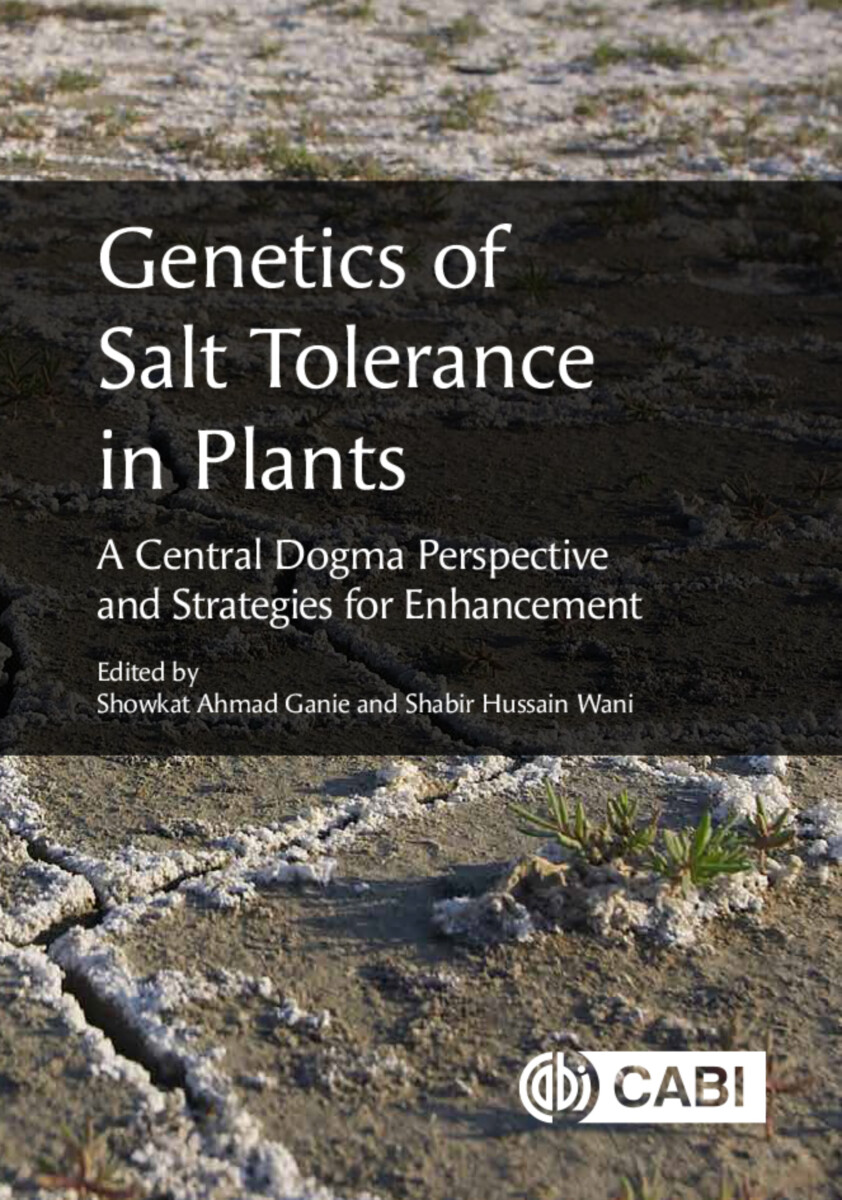Genetics of Salt Tolerance in Plants
A Central Dogma Perspective and Strategies for Enhancement
- Publisher
CABI - Published
31st July 2024 - ISBN 9781800623019
- Language English
- Pages 184 pp.
- Size 6" x 9"
Gene expression in cells follows a prescribed pathway that conforms to the Central Dogma; where the genetic information stored in DNA is transcribed into RNA and then expressed into proteins, which influences most plant traits. Plant salt tolerance research is directed towards identifying nucleotide variants that could contribute to tolerant phenotypes. This book comprehensively presents the current state of knowledge on plant salt tolerance through meticulous analysis of the processes operating across the Central Dogma. It provides a detailed account of modulation of gene expression through genome editing systems to achieve crop improvement against salt stress. It also provides state-of-the-art information on advances in breeding technologies of genome selection and accelerated de novo domestication for rapidly improving the salt tolerance of plants for global food security.
This book:
1. Provides comprehensive coverage of plant salt tolerance mechanisms.
2. Spotlights various factors functioning along the Central Dogma pathway and their regulation in response to salinity.
3. Examines how these factors function to protect the plants from high salinity.
4. Highlights advances in cutting-edge breeding technologies for improving salt tolerance.
The book will be of particular value to students and researchers of plant genetics, molecular biology and physiology and those with an interest in salinity and salt tolerance.
1. Involvement of Genetic Mutations in Plant Salt Tolerance--Usama Sheraz, Hamza Ramzan and Sajid Shokat
2. Regulation of Nucleotide Metabolism in Response to Salt Stress
3. Role of DNA Replication Proteins in Salinity Tolerance of Plants
4. Chromatin Architecture: Role of Epigenetic Modifications and Nucleosome Occupancy in Modulating Plant Responses to Salt Stress
5. Functional Role of RNA Binding Proteins in Plant Salt Tolerance
6. Sequestration of mRNAs: Role of Stress Granules and Processing Bodies in Plant Salt Tolerance
7. Updates on Protein Post-Translational Modifications for Modulating Response to Salinity
8. Integration of Genomics-Assisted and Speed Breeding for Enhancement of Plant Salt Tolerance
9. Advances in Plant Phenotyping for Enhanced Salt Tolerance
10. De novo Domestication of Wild and Halophilic Plants for Designing Salt Tolerant Crops: Acceleration through CRISPR
Showkat Ahmad Ganie
Dr. Showkat Ahmad Ganie is a Marie Sklodowska-Curie Individual Research Fellow at Royal Holloway, University of London, Egham, United Kingdom. He is a young scientist, and his research interests deal with understanding the regulation of abiotic stress (especially salt stress) responses in crops to increase their stress resistance, with the final aim to improve the crop productivity. He completed his PhD at ICAR-NBPGR, New Delhi, India, studying the molecular genetic diversity in rice with respect to salt tolerance. He has worked as a postdoctoral researcher at the University of Connecticut. Dr. Ganie has won several awards during his studies. He is currently a member of the Editorial Board of some reputed journals, including BMC Plant Biology, Food and Energy Security, AoB Plants, Journal of Plant Growth Regulation, Annals of Applied Biology, Plant Signaling & Behavior, and Heliyon.
Shabir Hussain Wani
Dr. Shabir Hussain Wani is an Assistant Professor (Senior Scale) cum Scientist, Genetics and Plant Breeding at Mountain Research Centre for Field Crops, Khudwani, Sher-e-Kashmir University of Agricultural Sciences and Technology, Srinagar J&K, India. He received a Ph.D. degree in plant breeding and genetics on "transgenic rice for abiotic stress tolerance" from the Punjab Agricultural University Ludhiana, India. He then joined the Krishi Vigyan Kendra (Farm Science Centre) as program coordinator (i/c) at Senapati, Manipur, India. He teaches courses related to plant breeding, seed science and technology, and stress breeding and has published more than 200 papers/chapters in journals and books of international and national repute. He served as guest editor and reviews editor for the journal Frontiers in Plant Science (2015-2018). He has also edited several books on current topics in crop improvement for abiotic stress tolerance published by Springer Nature and CRC press. His Ph.D. research fetched first prize in the North Zone Competition, at national level, in India during 2009. He also received Young Scientist Award (Agriculture) 2015 from Society for Plant Research, Meerut, India. He also served as visiting Scientist at Department of Plant Soil and Microbial Sciences, Michigan State University under the UGC Raman Post-Doctoral Fellowship program during 2016-17. He was elected as Fellow of Linnean Society of London 2017. He was felicitated with Award for Excellence in Research 2020 from Novel Research Academy, Puducherry, India and selected as a member of the Expert Working Group (EWG) Wheat Initiative for Adaptation of Wheat to Abiotic Stress (AWAS), Berlin, Germany during January 2021. He is also elected as Joint Secretary (Asia) for the Society for Plant Research, Vegetos (2021-2024). Currently, he is in charge of the wheat improvement program at MRCFC Khudwani SKAUST Kashmir under the ICAR-All India Coordinated Improvement Project on Wheat and Barley.


